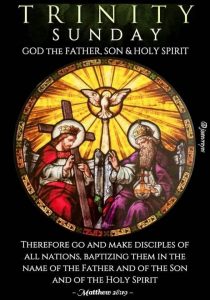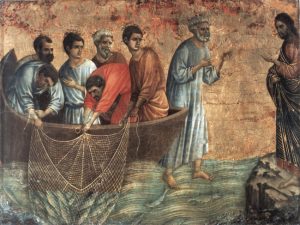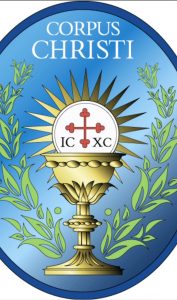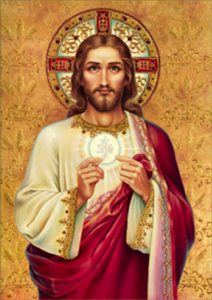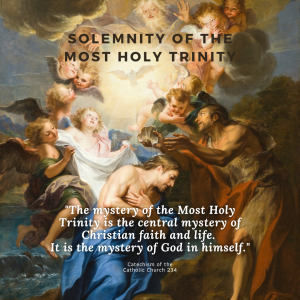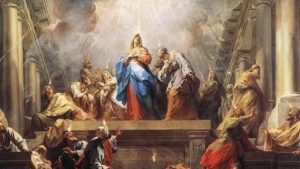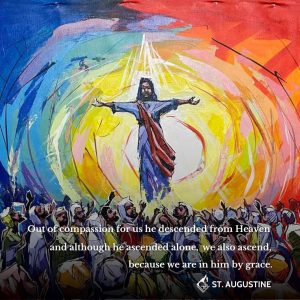Today is the Holy Trinity Sunday. As an Augustinian Friar, I would like to share this important doctrine of our belief according to the teaching of St. Augustine, who is one of the Church Fathers of Western Christianity. He wrote the book entitled, De Trinitite. The purpose of writing that book is to rectify the heretical teachings on the Trinity that were prevalent during his time. He uses the concept of love to explain the Trinity. He said there are three Persons sharing equal greatness and cannot be separated because they are ONE. The three persons are not indivisible for they act as one. When we speak of love there is only the whole power of love: the Person that loves, the Person who is loved and the Person who acts of love. St. Augustine wrote, “The Trinity does not work indivisibly, but the Father does some things, the Son other things, and the Holy Spirit yet others: or else, if they do some things together, some severally, then the Trinity is not indivisible.” De Trinitate 8:10
Sometimes people fret about other concerns to fill their minds and not simply opening our hearts to a deeper relationship with God who is love. When we celebrate this solemnity of the Holy Trinity, what we can do is simply think that we enter into a relationship with each Person in the Trinity.
In the first reading taken from the book of Deuteronomy, Moses keeps on reminding the chosen people that as they are faithful to God’s commandments, then the outcome would be fruitful land and blessed families. Loving is also the response of the Israelites to God. Historically, God continues to reveal His active involvement in their collective past. Moses reminded them not to forget it. Thus, their remembrance of the past leads them to a better future and allows this loving God, who fashioned Israel’s nation, to protect and provide them a promising future as exposed by the same Triune God.
The second reading from the letter of St. Paul to the Romans reminds them about their new identity as adopted children of God and heirs of His kingdom. They were made into the body of Christ, and the Holy Spirit works for their sanctification to produce more fruitful harvests and gifts which made them a sign of a visible God residing over them.
The readings today, including the gospel from St. Matthew, reveal the teaching of the Church on the Trinity as our dogma. I believe that even in the totality of the scriptures they are implicitly revealed. Our source of faith is not “sola scriptura,” but we look into other sources like the teaching of the Church Magisterium, Fathers of the Church and Theologians from the beginning of the Church’s existence up to the present.
When the disciples proceeded to the mountain in Galilee, they worshiped and still doubted according to the gospel text. However, Jesus being aware of the situation, has given them a blessing before sending them out into the world. He says, “All power in heaven and on earth has been given to me. Go, therefore, and make disciples of all nations…” (vv.17-19)
Let me point out striking points of the gospel we heard today:
First, Jesus has commissioned them to go out and baptize all in the name of the Father, and of the Son and of the Holy Spirit. This is an instruction from Jesus that all people would be baptized in the Trinitarian formula. This commissioning must be observed by all of us to go out and do our part to accomplish our shared mission for the Church. We are commanded to observe His laws and commandment of love, “teaching them all that I have commanded you.”
Second, Jesus’ instruction to baptize them in the name of the Father, of the Son and of the Holy Spirit made us aware that the baptism includes everyone, young and adults, slaves or free, rich or poor, with no race distinction. The word, “Them”, means all. Jesus did not say, baptize only the adult. It means “All,” which includes all members of the household.
Third, Jesus says, “Behold, I am with you always, until the end of time.” His perpetual presence is crucial in our lives as we all cooperate with the Holy Spirit to continue His mission. Jesus, who has been raised by the Father from the dead, has been fully alive and lives with us in another form, which is the indwelling of the Holy Spirit. He makes us remember and understand the way the Lord taught His disciples. What Jesus taught us benefits us to attain and live on earth in reverent loving relationships with each other.
Therefore, the three Persons of the Holy Trinity is a relationship which we are commanded to observe. The work, service and love we do to others are truly gifts we have been given which is the prompting of the Holy Spirit.
Every work is indeed the masterpiece of the goodness of God and our own goodness, which reveals the identity of the creator. The outcome of our work as created and the perseverance to fulfill it ultimately reveals the creator’s heart. The created work and the love we put into our works, all together is the sharing of that love.
The Trinity of God is definitely a mystery, and sometimes we struggle to understand this concept. Let us remember that we are God’s creation, and we cannot create ourselves; thus the immensity of creation is God’s and not ours.
Pope Frances has this to say to us, “Thinking that God is love does us so much good, because it teaches us to love, to give ourselves to others as Jesus gave himself to us and walks with us. Jesus walks beside us on the road through life.” (Trinity Sunday Homily). The Holy Trinity is a great comfort while being simultaneously accessible and hard to truly understand. May this reflection give you a clearer insight.
May the Triune God bless you.
Fr. Arlon, osa
———————————
El Dictado del Corazón
La Santísima Trinidad
- Deuteronomio 4:32-34, 39-40
- Salmo 33:4-5, 6, 9, 18-19, 20, 22
- Romanos 8:14-17
- Mateo 28:16-20
Hoy es el domingo de la Santísima Trinidad. Como fraile agustino, me gustaría compartir esta importante doctrina de nuestra creencia según las enseñanzas de San Agustín, quien es uno de los Padres de la Iglesia del cristianismo occidental. Escribió el libro titulado De Trinitite. El propósito de escribir el libro es rectificar las enseñanzas heréticas sobre la Trinidad que prevalecían durante su época. Utiliza el concepto de amor para explicar la Trinidad. Dijo que hay tres Personas que comparten la misma grandeza y que no pueden separarse porque son UNA. Las tres personas no son indivisibles porque actúan como una sola. Cuando hablamos de amor sólo existe todo el poder del amor: la Persona que ama, la Persona que ama y la Persona que actúa con amor. San Agustín escribió: “La Trinidad no actúa indivisiblemente, sino que el Padre hace unas cosas, el Hijo otras, y el Espíritu Santo aún otras; o bien, si hacen algunas cosas juntos, otras individualmente, entonces la Trinidad no es indivisible.” De Trinitate 8:10
A veces las personas se inquietan por otras preocupaciones para llenar sus mentes y no simplemente abrir sus corazones a una relación más profunda con Dios que es amor. Cuando celebramos esta solemnidad de la Santísima Trinidad, lo que podemos hacer es simplemente pensar que entramos en relación con cada Persona de la Trinidad.
En la primera lectura tomada del libro de Deuteronomio, Moisés sigue recordando al pueblo elegido que, si son fieles a los mandamientos de Dios, el resultado será una tierra fructífera y familias bendecidas. Amar es también la respuesta de los israelitas a Dios. Históricamente, Dios continúa revelando su participación en su pasado colectivo. Moisés les recordó que no lo olvidaran. Por lo tanto, su recuerdo del pasado los conduce a un futuro mejor y permite que este Dios amoroso, que formó la nación de Israel, los proteja y les proporcione un futuro prometedor expuesto por el mismo Dios Triuno.
La segunda lectura de la carta de San Pablo a los Romanos les recuerda su nueva identidad como hijos adoptivos de Dios y herederos de su reino. Fueron hechos el cuerpo de Cristo, y el Espíritu Santo obra por su santificación para producir cosechas y dones más fructíferos que los convirtieron en señal de un Dios visible que reside en ellos.
Las lecturas de hoy, incluido el evangelio de San Mateo, revelan la enseñanza de la Iglesia sobre la Trinidad como nuestro dogma. Creo que incluso en la totalidad de las escrituras están implícitamente reveladas. Nuestra fuente de fe no es la “sola scriptura”, sino que buscamos otras fuentes como las enseñanzas del Magisterio de la Iglesia, los Padres de la Iglesia y los teólogos desde el comienzo de la existencia de la Iglesia hasta el presente.
Cuando los discípulos subieron al monte de Galilea, adoraron y todavía dudaban según el texto del evangelio. Sin embargo, Jesús, consciente de la situación, les ha dado una bendición antes de enviarlos al mundo. Él dice: “Me ha sido dado todo poder en el cielo y en la tierra. Id, pues, y haced discípulos a todas las naciones…” (vv.17-19)
Señalare algunos puntos del evangelio que escuchamos hoy:
Primero, Jesús les ha encargado que salgan y bauticen a todos en el nombre del Padre, del Hijo y del Espíritu Santo. Esta es una instrucción de Jesús de que todas las personas serían bautizadas en la fórmula trinitaria. Este encargo debe ser observado por todos nosotros para salir y hacer nuestra parte para cumplir nuestra misión compartida para la Iglesia. Se nos ordena observar Sus leyes y mandamientos de amor, “enseñándoles todo lo que yo les he mandado”.
En segundo lugar, la instrucción de Jesús de bautizarlos en el nombre del Padre, del Hijo y del Espíritu Santo nos hizo conscientes de que el bautismo incluye a todos, jóvenes y adultos, esclavos o libres, ricos o pobres, y sin distinción de raza. La palabra “Ellos” significa todos. Jesús no dijo: bautiza sólo al adulto. Significa “Todos”, que incluye a todos los miembros del hogar.
En tercer lugar, Jesús dice: “He aquí, yo estoy con ustedes todos los días, hasta el fin de los tiempos”. Su presencia perpetua es crucial en nuestras vidas ya que todos cooperamos con el Espíritu Santo para continuar Su misión. Jesús, que ha sido resucitado por el Padre de entre los muertos, ha estado plenamente vivo y vive con y en nosotros en otra forma, que es la morada del Espíritu Santo. Nos hace recordar y comprender la forma en que el Señor enseñó a sus discípulos. Lo que Jesús nos enseñó nos beneficia para lograr y vivir en la tierra en relaciones amorosas y reverentes unos con otros.
Por lo tanto, las tres Personas de la Santísima Trinidad es una relación que se nos ordena observar. El trabajo, el servicio y el amor que hacemos a los demás son verdaderamente dones que nos han sido dados y que son el impulso del Espíritu Santo.
Cada obra es, en efecto, la obra maestra de la bondad de Dios y de nuestra bondad, que revela la identidad del creador, el resultado de nuestro trabajo. Una vez creado y la perseverancia para cumplirlo, finalmente revela el corazón del creador, la obra creada y el amor que ponemos en nuestras obras, todo junto es compartir ese amor.
La Trinidad de Dios es un misterio, a veces nos cuesta entender este concepto. Recordemos que somos creación de Dios y no podemos crearnos a nosotros mismos, por lo tanto, la inmensidad de la creación es de Dios y no nuestra.
El Papa Francisco tiene esto que decirnos: “Pensar que Dios es amor nos hace mucho bien, porque nos enseña a amar, a entregarnos a los demás como Jesús se entregó a nosotros y camina con nosotros. Jesús camina a nuestro lado en el camino de la vida.” (Homilía del Domingo de la Trinidad). La Santísima Trinidad es un gran consuelo y al mismo tiempo es accesible y difícil de comprender verdaderamente. Que esta reflexión les dé una visión más clara de la Divinidad de Dios.
Que el Dios Trino los bendiga.
P. Arlón, osa
